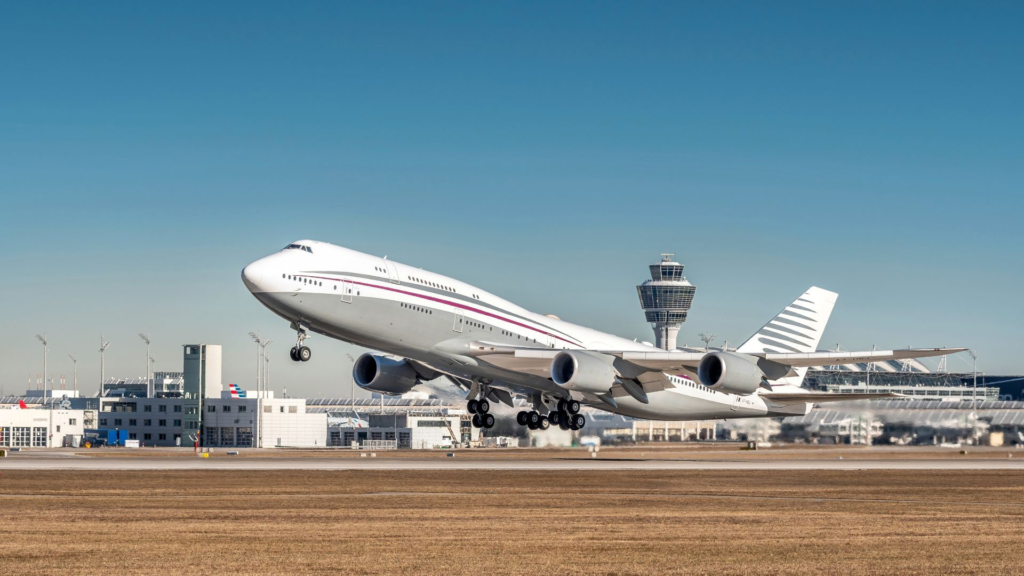Boeing’s Business Jet division (BBJ) has unveiled a new turnkey VIP service built around the Boeing 747-8 platform, targeting ultra-high-net-worth customers who demand the utmost in luxury, range, and customization for private maritime or global missions. The offering bundles aircraft procurement, completion, lifecycle support, and maintenance under a single program, promising clients a seamless path to owning the world’s largest private jet.
The 747-8 is already famed as being one of the largest airliners ever built. Clients opting in will benefit from an unmatched range (roughly 8,500 nautical miles), payload flexibility, and the prestige of the ‘Queen of the Skies’ in private liveries. ![]() Boeing says the program is aimed at governments, heads of state, and ultra-premium private users who value scale as much as sophistication.
Boeing says the program is aimed at governments, heads of state, and ultra-premium private users who value scale as much as sophistication.
The New Turnkey Service
The 747-8 VIP turnkey service offers a full suite: from aircraft selection and acquisition, detailed interior design, engineering and certification support, completion, training, and ongoing maintenance and support. Boeing aims to simplify what is typically a multivendor, complex procurement for VIP 747s. The idea is to reduce integration risk and project duration so clients can start operations sooner.
Interior offerings include multiple lounges, suites, conference rooms, master bedrooms, dedicated crew areas, advanced entertainment and communications systems, and extensive in-flight amenities. Because the platform is so large, clients have enormous flexibility in layout, allowing highly customized fit-outs. Boeing emphasizes that the VIP conversions will carry over the performance and reliability of the commercial 747-8.
Support is built into the package, and Boeing is committed to lifecycle maintenance, parts provisioning, avionics upgrades, and global support network access, so that aircraft owners do not bear the full burden of development and logistics. Boeing advertises that with nearly 150 747-8s in service, parts availability will be plentiful for decades. This level of turnkey support is what differentiates this from boutique VIP projects.
The Market Position
By offering turnkey VIP services on the 747-8, Boeing is tapping into a niche but lucrative market: deep-pocket buyers who demand scale, range, and distinction. Most private jets are smaller aircraft roughly equivalent to a regional jet or small mainline narrowbody, and as such, few can match a 747’s capacity and prestige, making this a standout product in the VIP global travel segment.
As governments and ultra-high-net-worth individuals seek mobile command centers or luxury transport across continents, the 747-8 VIP fills a gap no other aircraft currently occupies. The platform’s performance (speed, altitude, and range) means fewer stopovers and more direct missions. Its size, meanwhile, means that the jet offers more floor space than any other private jet.
|
Variant |
Number Produced |
|---|---|
|
Boeing 747-8I |
48 |
|
Boeing 747-8F |
107 |
For Boeing, this initiative may also leverage dormant 747-8 parts production or facility capabilities, plus its deep experience in global support networks. It keeps the 747 family alive in the aerospace ecosystem and signals to customers that Boeing is willing to innovate beyond the mainstream, while also differentiating the company in the private aviation industry. This should also lead to confidence in the business jet division as a whole, given the complexity of the platform.
The Challenges Of The Program
Boeing 747-8s are huge. Not only does this mean that capital, conversion, and operating costs are eyewateringly high, but the plane is also impractical, which means that market demand is limited. The pool of buyers who can afford and use such massive VIP aircraft is small. If only a few orders materialize, the program’s economics may struggle.
Transforming a commercial 747-8 into a bespoke VIP aircraft is capital-intensive and complex. The engineering, certification, and systems integration burden is high, especially when tailoring to unique customer specifications. Delays, cost overruns, or technical integration issues are real risks in such highly customized projects.
There’s also certification and regulatory complexity to deal with. VIP modifications must meet airworthiness standards, safety, environmental, noise, and operational compliance. When dealing with very large aircraft and unique interiors, ensuring that everything from weight and balance to emergency systems complies is a complex certification undertaking.





